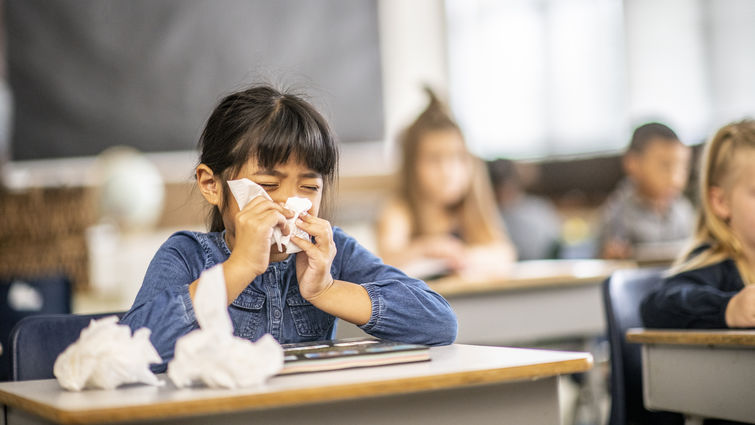
It's the back-to-school season, and as kids adapt to their routines, the last thing parents want is sickness to keep them home. However, Kathleen Lima, DO, a pediatrician at Loma Linda University Children's Hospital, says it's important to recognize when to keep your child home from school if they're sick. Kids may be better off missing a day or two to rest and mend than potentially missing multiple days because of a worsening illness.
"It's important to keep your child home so they may recover," Lima says. "We also don't want to continue to spread viral illnesses that may jeopardize the health of their classmates, teachers, and friends."
So, when should sickness be keeping my child home from school?
Lima says some of the symptoms to look out for include:
- Fever in the last 24 hours
- Vomiting
- Diarrhea
- Persistent coughing
- A new rash
If your child is experiencing any of those symptoms, pediatricians recommend having your child stay home from school. Additionally, if your child seems too ill to focus properly and have a productive day, consider keeping them home, Lima says.
What if their symptoms are mild? And when should they be tested?
"If their symptoms are mild and improving, they may return to school," she says.
Also, consider if your child has a history of allergies, asthma, or eczema, as these conditions may appear as signs of illness. "Kids may attend school if their symptoms are not worsening or are not different than their baseline," Lima says.
She recommends visiting a pediatrician to address ongoing health concerns. And suppose your child has continued symptoms of illness even after resting at home. In that case, Lima recommends contacting your pediatrician for further evaluation and possible testing, such as testing for COVID-19, influenza, strep throat, etc.
What about COVID-19?
The continued circulation of COVID-19 has only complicated illnesses for school-aged kids. "It's difficult to know how to handle 'routine' childhood illness and sick days now that we are trying to determine if it's COVID-19," Lima says. "This is hard for parents, teachers, and school administration."
Since many COVID-19 symptoms overlap with other common illnesses, Lima recommends that parents keep a small supply of rapid tests handy. "If your child is having symptoms of COVID-19, they should be tested," she says. "If they are negative and feel up to it — due to mild symptoms — they could go to school."
Reach out to your pediatrician
The bottom line is illness during this season may be challenging to navigate, but remember to trust your gut as you know your child's health needs and seek guidance if you have questions or concerns about their health.
Lima encourages parents to continue teaching and emphasizing good hand washing and sanitizing practices for their kids. "Also, parents could consider voluntarily having a child wear a mask if they aren't feeling well, even with a negative COVID-19 test," she says. "We strongly encourage any child over six months of age to be vaccinated and boosted against COVID-19."
Loma Linda University Children's Hospital is here to support you with video visits or in-person appointments. Visit our website to schedule your child's appointment.
